Mothers of Iran's Killed Protesters Denounce Upcoming Presidential Election
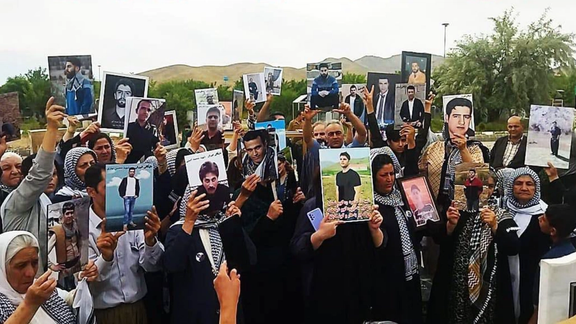
Mothers of slain Iranian protesters and dissidents have denounced the upcoming June 28 snap presidential election in Iran, calling it a "circus."

Mothers of slain Iranian protesters and dissidents have denounced the upcoming June 28 snap presidential election in Iran, calling it a "circus."
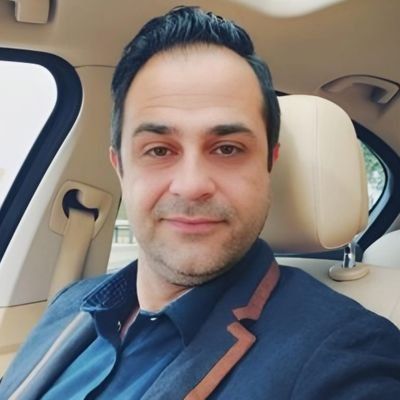
An Iranian dissident escaped an assassination attempt in the Netherlands earlier this month, according to the French daily Le Monde, in what seems to be yet another sign of Iran’s resolve to silence voices of dissent outside the country.
The targeted dissident, Siamak Tadayon Tahmasebi, was singled out in an Iranian intelligence press release last summer, accused of leading a “terrorist” ring inside Iran from exile. The statement, dated 30 August 2023, linked Tahmasebi to the Israeli secret service.
On 6 June, Tahmasebi noticed two men attempting to enter his home near Amsterdam. He alerted the police, who arrived in time to arrest the armed intruders. The northern Netherlands prosecutor's office confirmed the arrests and the possession of firearms by the intruders.
One of the two suspects, Mehrez Ayari, is a 38-year-old Tunisian criminal from Villejuif, Val-de-Marne, France. He has been previously linked to the failed assassination of Spanish politician Alejo Vidal-Quadras, a supporter of Iranian opposition, in November 2023.
“When I learned about Ayari's profile,” Tahmasebi told Le Monde, “I was half happy because the police had caught a big fish, and half worried because it meant that the Islamic Republic really wanted to kill me: they had sent a professional.”
Ayari had been sought by French police since August 2022, accused of murdering a cannabis dealer. His involvement in both the attempted assassination of Vidal-Quadras and the attempt on Tahmasbi strengthens the hypothesis of Tehran's involvement.
The Islamic Republic has a long history of targeting dissidents in exile. Dozens of assassinations have been attempted ever since the 1979 Revolution, often involving non-Iranians that help those who order the attacks deny complicity.
Last month, Israeli and Swedish intelligence agencies revealed that criminal gangs operating on Iran’s behest were behind several terror attacks on Israeli embassies in Europe.
In the past few years, Iranian journalists working outside Iran have become a prime target for Tehran's campaign of terror and intimidation.
Iran International presenter Pouria Zeraati was stabbed outside his home in south London in March, but survived with injuries to his leg. Investigations into the crime suggested that the three suspected assailants were recruited in Easter Europe and flown to the UK to attack Zeraati.
Earlier this month, another Iran International reporter, Mehran Abbasian, had to be moved to a secure location following threats to his life.
The threats against Iran International staff have become a recurrent issue, stemming back to 2022. The threats reached a climax with the UK's MI5 saying it could no longer protect the team, forcing a temporary relocation to the US.
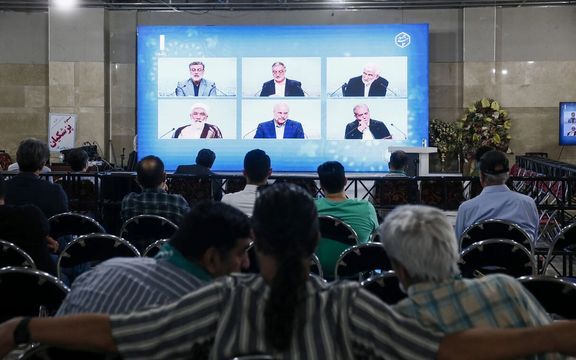
As the only pro-reform individual among six handpicked candidates in Iran’s presidential race apparently enjoys a lead, Masoud Pezeshkian has come under attack by the others, who mostly prescribe the same old policies.
They have accused Masoud Pezeshkian of not being a reformist, but trying to win the election in order to form a government that would be a continuation of pragmatist former President Hassan Rouhani’s administration.
Pezeshkian did not respond to the repeated accusations during the last two debates on Monday and Tuesday. Instead, he reiterated his obedience to Supreme Leader Khamenei and his commitment to implementing Khamenei's master plan for the country. He likely aimed to demonstrate his loyalty to Khamenei in an attempt to appease hardliners. However, this stance did little to impress reform-minded Iranians who were considering voting for him.
On Tuesday, three players other than the candidates made news by what they said. First it was Khamenei who delivered a speech that was aired live. He cautioned voters to vote for a candidate who is loyal to the regime and is determined to carry out “positive executive work.”
While some observers said he was alluding to Pezeshkian who has pledged allegiance to Khamenei during the debates and has a background in executive affairs as a former Health Minister, others opined that Khamenei was telling the voters to choose Saeed Jalili, who happens not to have played any part in the executive branch . Some netizens pointed out that the color of the stone on the gem in Khamenei's ring during his speech was the same as Pezeshkian campaign's chosen color.
On the ground and apart from the online world of armchair political analysts, videos that went viral on social media showed that in some cities including Qazvin there were posters on the walls that showed another candidate, Mohammad Bagher Ghalibaf next to Khamenei's son Mojtaba. Netizens interpreted that as part of the plan to groom Ghalibaf as the next president.
Another non-candidate player who came under media spotlight, was former Oil Minister Bijan Namdar Zanganeh who was accused several times by some of the candidates including Tehran Mayor Alireza Zakani of financial corruption by signing the wrong harmful oil contracts with entities in the United Arab Emirates.
Videos of Zanganeh went viral on the Persian social media on Tuesday rejecting the accusations and calling on the state television and the candidates involved to take part in live televised debates with him.
Meanwhile, a quarrel broke out between Jalili and Pourmohammadi over the same issue as Jalili accused Pourmohammadi of concealing the evidence in the case when he was the chief inspector. Pourmohammadi also said that he was ready to discuss this with Jalili on live television.
The third player whose words became more important than what the candidates said was former President Hassan Rouhani who protested for the third time that some candidates have levelled accusations on him and his government that he needs to be given an opportunity to respond and make the matter clear for the nation based on the country's election law.
Rouhani said in an interview posted on social media that hardline candidates spoke in a way as if the Raisi administration (2021-2024) never existed and blamed him and his government for the shortcomings and wrongdoings that took place under Raisi's presidency. The state TV was not observed to react to Rouhani's statement although he also sent a complaint in writing to the state television.
Still, the strangest comment was made by Khamenei who spoke in a way as if he was not sure the Guardian Council had made the right decision with handpicking the six candidates. He warned the voters that some of the candidates might serve the interests of the United States, repeating his decades-long argument that “the enemies” were plotting against the Islamic Republic.
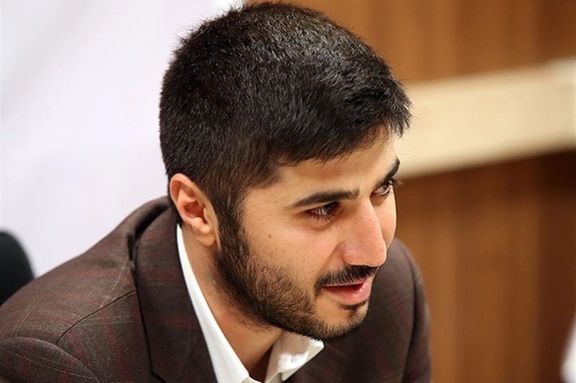
A former Iranian official who has been under "administrative detention" in France since June 3, was detained for links to the Revolutionary Guard's Quds Force, among other reasons, Iran International has learned.
Bashir Biazar, a former director Iran's state broadcast, "is connected with the Unit 840 of the Quds Force of the Islamic Revolutionary Guard Corps (IRGC) whose mission is to conduct covert and/or terrorist operations outside Iran," according to French Interior Ministry documents seen by Iran International.
The documents introduce Biazar as a "producer for Iran's state radio and television" and as someone "very close to pro-regime Iranians or official representatives of the Islamic Republic."
Biazar, who is awaiting deportation to Iran, is currently in administrative detention—a procedure utilized for urgent deportation cases under French law.
Meanwhile, a group of activists and former French-Iranian prisoners in Iran have filed a torture complaint against Biazar to stop his deportation to Iran.
The activists and former prisoners have accused Bashir Biazar, a former director of the Islamic Republic of Iran Broadcasting (IRIB), of complicity in the torture of prisoners.
Iran's state television has on numerous occasions aired forced “confessions” of political and ordinary prisoners including dual and foreign nationals taken under physical and psychological torture.
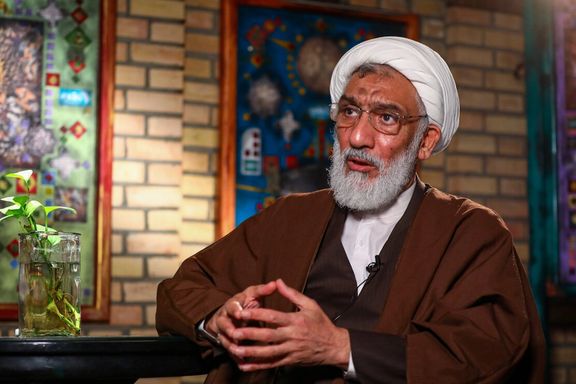
Iranian presidential candidate and cleric Mostafa Pourmohammadi has downplayed his role in the mass executions of dissidents carried out by the Islamic Republic during the 1980s.
"The narrative of the 1980s is quite different. The people were our supporters, sharing our views. In fact, their demands were more severe, and they called for harsher sentences," Pourmohammadi said in an interview published on YouTube last week.
After a fatwa by Supreme Leader Ruhollah Khomeini, authorities carried out the extrajudicial executions of thousands of political prisoners across Iranian jails in 1988. Amnesty International estimates that between late July and September of that year, a minimum of 5,000 people were killed, with their bodies dumped in unnamed individual and mass graves. Iranian exiles claim the total number of deaths could be over 20,000.
Pourmohammadi referred to the execution of political prisoners in the summer of 1988 as "a project of the Islamic Republic.
“These were challenging times for the system, marked by intense conflict. We had to make critical decisions,” he added.
Pourmohammadi has held several key roles within the state but is widely known to the public for his role on the “Death Committee.”
These were three-person committees established by the state to oversee the purge of political prisoners in each Iranian jail. Each comprised a prosecutor, a judge, and a representative of the Ministry of Information. Pourmohammadi represented the Ministry of Information on the committee at Tehran’s notorious Evin Prison.
Along with other recognizable figures, including former President Ebrahim Raisi, he would sentence political prisoners for summary executions in 1988.
In response to the association of his name with executions on social media, Pourmohammadi stated, "What can I do? I served as a judge for a period. My duties involved either conducting trials or drafting indictments. Some individuals were fined, some were imprisoned, and some were executed. It is akin to a doctor whose name becomes synonymous with performing surgeries."
Regarding his role in these executions, Pourmohammadi attempted to justify the actions by emphasizing that “only” individuals affiliated with the opposition group Mojahedin-e-Khalq Organization (MKO) who were actively "engaging in hostilities against the people" were sentenced to death by the oversight committees.
Pourmohammadi did not refer to the many individuals, part of left-leaning opposition parties, who were also among those executed.
According to Amnesty International, throughout Iran, “predominantly young men and women, including teenagers, who were unjustly imprisoned for their political views and non-violent activities” were gathered from their cells and presented before "death commissions" composed of judicial, prosecutorial, and intelligence authorities.
They underwent brief and arbitrary interrogations where their answers could determine their fate. In some instances, prisoners were offered the chance to renounce their political beliefs and affiliations in exchange for a pardon or commutation of their death sentences. Many prisoners, however, refused to recant their beliefs, resulting in their execution.
Pourmohammadi appeared to suggest that during the interrogations of political prisoners, he implored them to answer the committee’s questions in a way that would spare them from the death sentence.
The current presidential candidate has previously held other key positions in the Islamic Republic, including deputy intelligence minister, head of the social-political bureau in the Supreme Leader's Office, and leader of the General Inspectorate Organization. He also served as interior minister under President Mahmoud Ahmadinejad and as justice minister under President Hassan Rouhani.
Last week, Javaid Rehman, the UN Special Rapporteur on Iran commented on the mass executions in the 1980s, saying, “The whole exercise of the Death Commissions was not to use law.”
“It was simply to execute people based on what those commissioners felt, whether they were going to repent or whether they were going to be steadfast in their political ideological positions. And that is what happened, that the commission sent thousands of people to their execution,” Rehman said.
“What happened was that, obviously, it was not a court of law, so they did not have any rights. They could not question the judgments of these commissions. They were executed at a very short notice. Many of them could not defend their case. They were asked questions that were not legal,” he added.
During the final days of the 1980-1988 Iran-Iraq War, executions were conducted following Khomeini's declaration that apostates and those who had taken up arms against the Islamic Republic were guilty of "waging war against God" and thus deserving of death sentences.
In 2016, an audio recording from 1988 surfaced featuring Hossein Ali Montazeri, once poised to become Iran's supreme leader, condemning the authorities for implementing a fatwa issued by Khomeini.
"I believe the greatest crime in the history of the Islamic Republic, for which history will condemn us, has been committed by you," Montazeri told a group of judiciary officials involved in the executions, including Pourmohammadi.
"Your names will go down in history as criminals," Montazeri said.
Conversely, in his latest interview, Pourmohammadi claimed that Montazeri considered him a “devout and competent” individual.
The crimes committed in the 1980s, described by Rehman as crimes against humanity, have not led to the prosecution of those involved in Iran.
In a landmark case in 2022, a Swedish court found Hamid Nouri, a former Iranian official, guilty of war crimes for his involvement in the mass executions of political prisoners. This marked the first prosecution of an Iranian official implicated in these mass murders, which Tehran has never formally acknowledged.
Earlier this month, Nouri, who had been sentenced to life in prison, returned to Iran as part of a prisoner swap between Sweden and Iran. The exchange secured the release of two Swedish citizens who were imprisoned in Iran.
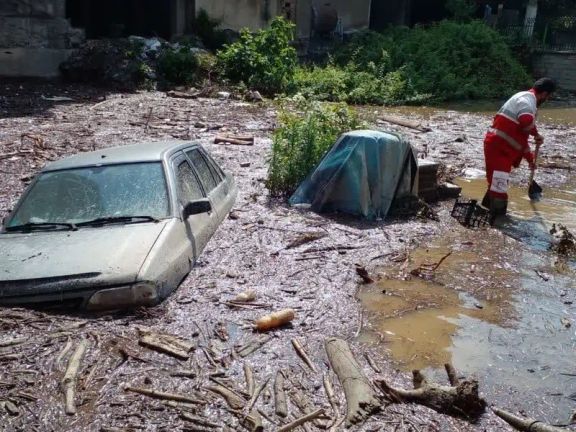
A flood has hit northern Iran on Tuesday evening, leaving five people missing and 24 injured.
The flood, triggered by severe rainfall that began Tuesday afternoon, resulted in the overflow of the Telar River and subsequent flooding in the area of Savadkuh, Mazandaran province.
The event caused extensive damage to roads, infrastructure, residential homes, and farmlands in an area already suffering desperate poverty.
Gholamali Fakhari, the head of the Red Crescent Society in Mazandaran, said Wednesday afternoon that the number of people missing has increased to five.
Earlier, he had confirmed that a 15-year-old girl and a 45-year-old woman are missing and rescue operations underway in the area.
The General Directorate of Crisis Management in Mazandaran recorded between 40 to 60 millimeters of rain in less than one hour. An alert for heavy rainfall and potential flooding had been issued prior to the disaster.
The flood follows closely on the heels of severe floods earlier this month when the Red Crescent Society reported 13 provinces had been affected, including Esfahan, Tehran, Semnan, Zanjan, Qazvin, and East Azerbaijan.
In May, floods in Khorasan Razavi province resulted in at least seven deaths, and prior to that, flooding in Sistan-Baluchestan also suffered from floods that resulted in at least 18 deaths and disappearances.
Critics blame the Islamic Republic's persistent neglect of essential infrastructure, the failure to dredge rivers adequately, and the lack of a proper urban water channel system as primary contributors to the repetitive cycle of devastating floods.
In a joint statement Wednesday, they said that Iran's government has caused immense suffering through executions and violence. Yet, ahead of elections, candidates implicated in these crimes talk of freedom and improvement
They added, "We will not stop seeking justice until we get our right to try and punish the criminals who innocently executed and shot our children."
Gohar Eshghi, mother of blogger Sattar Beheshti who was killed under torture in an Iranian prison, separately urged the public to boycott the elections in a video message shared on her Instagram.
""Boycott this government charade! Let the liars and their reformist/hardliner pawns play alone. The world will again hear our answer: NO to the Islamic Republic!” she wrote in the post’s caption.
Azamat Azhdari, whose sister Ghanimat Azhdari was killed on Ukrainian Flight PS752 shot down in 2020 by Revolutionary Guards (IRGC), also released a video. Azhdari said that there is an "ocean of blood" between the voters and people like her.
Similar statements have been shared recently by other family members of slain Iranian protesters of the 2022 uprising in Iran.
Many Iranian activists, student groups, cultural figures, and prominent current and former political prisoners in Iran have called for a boycott of the upcoming elections.
During Iran’s 2022 protests, at least 500 protestors were killed by state security forces, and tens of thousands were arrested.
Iran's 2024 snap presidential elections were announced following the sudden death of Ebrahim Raisi in a helicopter crash last month.